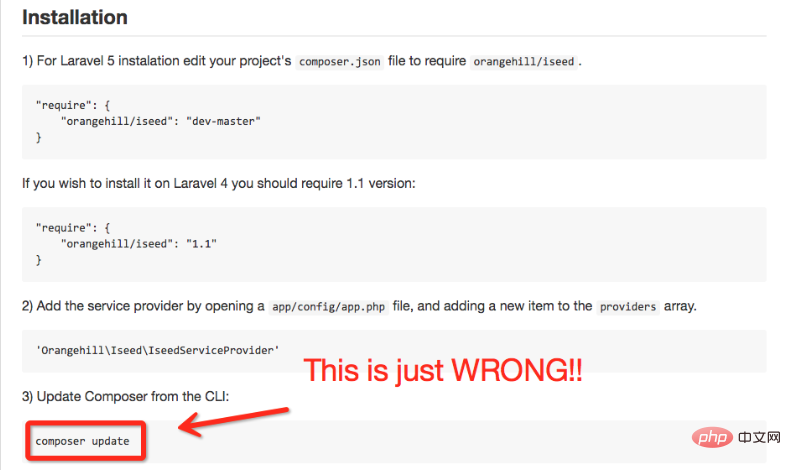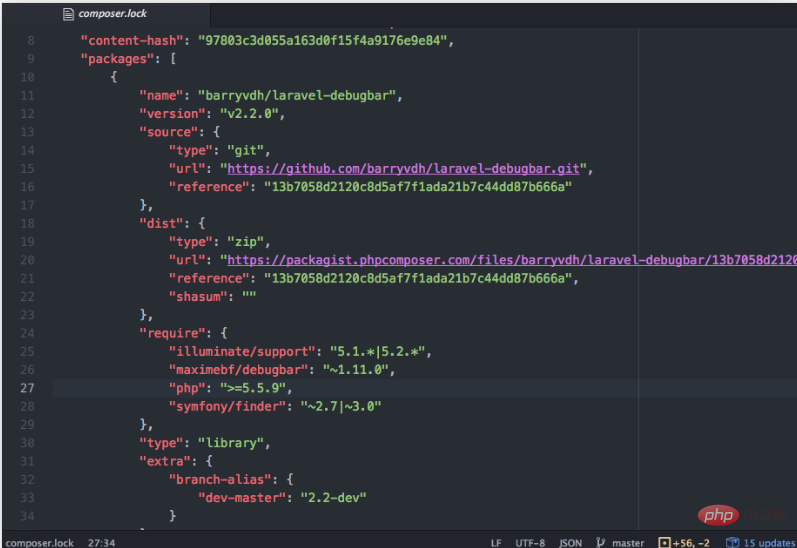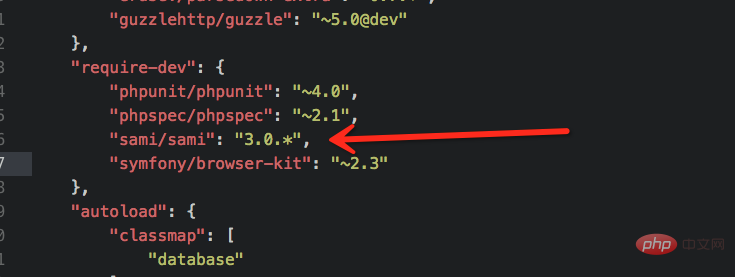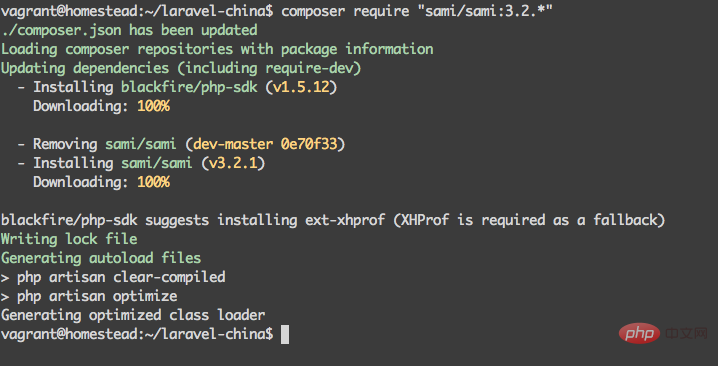 Development Tools
Development Tools
 composer
composer
 Detailed explanation of the difference between composer.josn and composer.lock, as well as the difference between Composer install and Composer updata
Detailed explanation of the difference between composer.josn and composer.lock, as well as the difference between Composer install and Composer updata
Detailed explanation of the difference between composer.josn and composer.lock, as well as the difference between Composer install and Composer updata
The following column composer tutorial will introduce to you the difference between composer.josn and composer.lock, as well as the detailed explanation of the difference between Composer install and Composer updata. I hope it will be helpful to friends who need it. help!

Problem description
We often need to add expansion packs to existing projects. Sometimes due to incorrect guidance in the documentation, The following picture comes from this document:

composer update This command may cause huge harm to the project in our current logic.
Because the logic of composer update is to update all expansion packages to the latest version according to the expansion package version rules specified by composer.json. Note, it is all expansion packages. For example, when you start the project Monolog was used, and the configuration information at that time was
"monolog/monolog": "1.*",
The monolog 1.1 version was installed, and now, more than a month later, monolog has It is 1.2. After running the command, it is directly updated to 1.2. At this time, the project has not been tested for 1.2. The project suddenly becomes very unstable. The situation is sometimes worse than this, especially in a huge project. If you don't write complete coverage tests for the project, you won't know what is broken.
Which composer command should be used? install, update or require?
Next we will explain one by one.
Simple explanation
composer install - If there is a composer.lock file, install it directly, otherwise install the latest expansion package and dependencies from composer.json;
composer update - From composer .json installs the latest extension packages and dependencies;
composer update vendor/package - configure the configuration from composer.json or the corresponding package, and update it to the latest;
composer require new/package - add installation new/package, you can specify the version, such as: composer require new/package ~2.5.
Process
Let’s introduce several daily production processes to facilitate everyone’s understanding understanding.
Process 1: New project process
Create composer.json and add the extension package it depends on;
Run composer install to install the extension package And generate composer.lock;
Submit composer.lock to the code version controller, such as: git;
Process 2: Project collaborators install existing projects
After cloning the project, run composer install directly in the root directory to install the specified version of the expansion package and its dependencies from composer.lock;
This process is suitable for the deployment of production environment code.
Process 3: Add a new extension package to the project
Use composer require vendor/package to add the extension package;
Submit the updated composer.json and composer.lock to the code version controller, such as: git;
About the composer.lock file
The composer.lock file stores the dependencies of each code The version record (see figure below) is submitted to the version controller and used in conjunction with composer install to ensure the consistency of the code versions running in the development environment and online production environment of all collaborators in the team.

About the installation method of the expansion package
So, prepare to add an expansion package, install, update, require three commands It can be used to install expansion packs. Which one is the right one to choose?
The answer is: use the composer require command
In addition, after manually modifying composer.json to add the expansion package, composer update new/package can be used to specify the expansion package update method, which can also be installed correctly. , but it is not recommended to use this method, because once you forget to finalize the expansion package name, you will enter a state of doom, so don't leave yourself a trap.
The above concepts are quite confusing for novices or veterans. The main thing to remember is this concept:
To add extensions to the original project, use composer require new/package. way to install.
If you need to add a version
composer require "foo/bar:1.0.0"
Update the specified extension to the specified version
Sometimes you used before New features have been added to the previous expansion pack. If you want to update this single expansion pack to a specified version, you can also use require to do so.
As in the following example, you need to update "sami/sami": "3.0." to "sami/sami": "3.2."

Command line run:

over!
The above is the detailed content of Detailed explanation of the difference between composer.josn and composer.lock, as well as the difference between Composer install and Composer updata. For more information, please follow other related articles on the PHP Chinese website!

Hot AI Tools

Undresser.AI Undress
AI-powered app for creating realistic nude photos

AI Clothes Remover
Online AI tool for removing clothes from photos.

Undress AI Tool
Undress images for free

Clothoff.io
AI clothes remover

Video Face Swap
Swap faces in any video effortlessly with our completely free AI face swap tool!

Hot Article

Hot Tools

Notepad++7.3.1
Easy-to-use and free code editor

SublimeText3 Chinese version
Chinese version, very easy to use

Zend Studio 13.0.1
Powerful PHP integrated development environment

Dreamweaver CS6
Visual web development tools

SublimeText3 Mac version
God-level code editing software (SublimeText3)

Hot Topics
 Laravel Introduction Example
Apr 18, 2025 pm 12:45 PM
Laravel Introduction Example
Apr 18, 2025 pm 12:45 PM
Laravel is a PHP framework for easy building of web applications. It provides a range of powerful features including: Installation: Install the Laravel CLI globally with Composer and create applications in the project directory. Routing: Define the relationship between the URL and the handler in routes/web.php. View: Create a view in resources/views to render the application's interface. Database Integration: Provides out-of-the-box integration with databases such as MySQL and uses migration to create and modify tables. Model and Controller: The model represents the database entity and the controller processes HTTP requests.
 Solve caching issues in Craft CMS: Using wiejeben/craft-laravel-mix plug-in
Apr 18, 2025 am 09:24 AM
Solve caching issues in Craft CMS: Using wiejeben/craft-laravel-mix plug-in
Apr 18, 2025 am 09:24 AM
When developing websites using CraftCMS, you often encounter resource file caching problems, especially when you frequently update CSS and JavaScript files, old versions of files may still be cached by the browser, causing users to not see the latest changes in time. This problem not only affects the user experience, but also increases the difficulty of development and debugging. Recently, I encountered similar troubles in my project, and after some exploration, I found the plugin wiejeben/craft-laravel-mix, which perfectly solved my caching problem.
 Use Composer to solve the dilemma of recommendation systems: andres-montanez/recommendations-bundle
Apr 18, 2025 am 11:48 AM
Use Composer to solve the dilemma of recommendation systems: andres-montanez/recommendations-bundle
Apr 18, 2025 am 11:48 AM
When developing an e-commerce website, I encountered a difficult problem: how to provide users with personalized product recommendations. Initially, I tried some simple recommendation algorithms, but the results were not ideal, and user satisfaction was also affected. In order to improve the accuracy and efficiency of the recommendation system, I decided to adopt a more professional solution. Finally, I installed andres-montanez/recommendations-bundle through Composer, which not only solved my problem, but also greatly improved the performance of the recommendation system. You can learn composer through the following address:
 Improve Doctrine entity serialization efficiency: application of sidus/doctrine-serializer-bundle
Apr 18, 2025 am 11:42 AM
Improve Doctrine entity serialization efficiency: application of sidus/doctrine-serializer-bundle
Apr 18, 2025 am 11:42 AM
I had a tough problem when working on a project with a large number of Doctrine entities: Every time the entity is serialized and deserialized, the performance becomes very inefficient, resulting in a significant increase in system response time. I've tried multiple optimization methods, but it doesn't work well. Fortunately, by using sidus/doctrine-serializer-bundle, I successfully solved this problem, significantly improving the performance of the project.
 How to quickly build Fecmall advanced project templates using Composer
Apr 18, 2025 am 11:45 AM
How to quickly build Fecmall advanced project templates using Composer
Apr 18, 2025 am 11:45 AM
When developing an e-commerce platform, it is crucial to choose the right framework and tools. Recently, when I was trying to build a feature-rich e-commerce website, I encountered a difficult problem: how to quickly build a scalable and fully functional e-commerce platform. I tried multiple solutions and ended up choosing Fecmall's advanced project template (fecmall/fbbcbase-app-advanced). By using Composer, this process becomes very simple and efficient. Composer can be learned through the following address: Learning address
 How to simplify email marketing with Composer: DUWA.io's application practices
Apr 18, 2025 am 11:27 AM
How to simplify email marketing with Composer: DUWA.io's application practices
Apr 18, 2025 am 11:27 AM
I'm having a tricky problem when doing a mail marketing campaign: how to efficiently create and send mail in HTML format. The traditional approach is to write code manually and send emails using an SMTP server, but this is not only time consuming, but also error-prone. After trying multiple solutions, I discovered DUWA.io, a simple and easy-to-use RESTAPI that helps me create and send HTML mail quickly. To further simplify the development process, I decided to use Composer to install and manage DUWA.io's PHP library - captaindoe/duwa.
 laravel installation code
Apr 18, 2025 pm 12:30 PM
laravel installation code
Apr 18, 2025 pm 12:30 PM
To install Laravel, follow these steps in sequence: Install Composer (for macOS/Linux and Windows) Install Laravel Installer Create a new project Start Service Access Application (URL: http://127.0.0.1:8000) Set up the database connection (if required)
 How to view the version number of laravel? How to view the version number of laravel
Apr 18, 2025 pm 01:00 PM
How to view the version number of laravel? How to view the version number of laravel
Apr 18, 2025 pm 01:00 PM
The Laravel framework has built-in methods to easily view its version number to meet the different needs of developers. This article will explore these methods, including using the Composer command line tool, accessing .env files, or obtaining version information through PHP code. These methods are essential for maintaining and managing versioning of Laravel applications.





